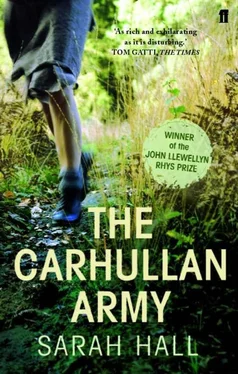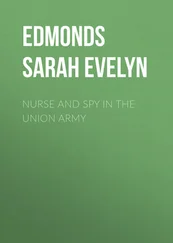Sarah Hall - The Carhullan Army
Здесь есть возможность читать онлайн «Sarah Hall - The Carhullan Army» весь текст электронной книги совершенно бесплатно (целиком полную версию без сокращений). В некоторых случаях можно слушать аудио, скачать через торрент в формате fb2 и присутствует краткое содержание. Год выпуска: 2008, Издательство: Faber and Faber, Жанр: Современная проза, на английском языке. Описание произведения, (предисловие) а так же отзывы посетителей доступны на портале библиотеки ЛибКат.
- Название:The Carhullan Army
- Автор:
- Издательство:Faber and Faber
- Жанр:
- Год:2008
- ISBN:нет данных
- Рейтинг книги:4 / 5. Голосов: 1
-
Избранное:Добавить в избранное
- Отзывы:
-
Ваша оценка:
- 80
- 1
- 2
- 3
- 4
- 5
The Carhullan Army: краткое содержание, описание и аннотация
Предлагаем к чтению аннотацию, описание, краткое содержание или предисловие (зависит от того, что написал сам автор книги «The Carhullan Army»). Если вы не нашли необходимую информацию о книге — напишите в комментариях, мы постараемся отыскать её.
The Carhullan Army — читать онлайн бесплатно полную книгу (весь текст) целиком
Ниже представлен текст книги, разбитый по страницам. Система сохранения места последней прочитанной страницы, позволяет с удобством читать онлайн бесплатно книгу «The Carhullan Army», без необходимости каждый раз заново искать на чём Вы остановились. Поставьте закладку, и сможете в любой момент перейти на страницу, на которой закончили чтение.
Интервал:
Закладка:
If she had been created on a philosophical specimen dish then her genetic beliefs had been altered to make her more resilient and assured of herself, more companionable to her own kind. She had not been exposed to a world of inferiority or cattiness, nor male dominance. She was, in a way, an idealised female. When she spoke of the outlying world it was with disapproval but not with trepidation, and I could not help wondering whether she might be more vulnerable or more fortified because of it. There was something gallant about her. She considered that most of the women left down in the zones were in need of her assistance. They were like slaves, she said. They needed to be freed. And I had been very sensible to come here. She admired me for it. ‘You should shave your head like mine though,’ she told me at the end of our dinner together. ‘That fluff won’t last.’ I laughed and said I would think about it.
Towards the end of the second week she found me in the kitchen helping those cleaning the plates and rinsing them in the sink. She handed me a piece of blue stone looped at the ends with wire and attached to a lace. She had on a similar necklace. ‘You don’t have to wear it if you don’t like it,’ she said. ‘There won’t be any offence.’ I thanked her and asked her to fasten it behind my neck but she refused, saying it would be inappropriate and that I should do it myself. She moved back into the crowd and began drinking with the rest of the women. In the corner I saw Jackie watching me, a bottle of spirit stowed next to her on the hearth, the contents glowing in front of the flames.
*
Not all the evening meetings were given over to entertainment and carousing. There were formal discussions and debates that ran to order. There were at least two of these a month I learned. I could remember hearing some of the debates in the old Houses of Parliament on my father’s radio. They were torrid and wasteful affairs, conducted by obtuse politicians, interrupted by jeers and barracking, and filled with disparaging comments. In the weeks preceding the collapse they had ceased to be broadcast and the public had been left to speculate about whether the dysfunction had increased and paralysed the mechanism altogether, or whether representatives were belatedly getting down to the business of trying to prevent the country’s ruin. Not long after that, the Thames flood barrier had been overwhelmed and tidal water had filled the building.
At Carhullan things were startlingly different. Disagreements were expressed through uninterrupted statements and anyone butting in forfeited her right to speak that night. Women took turns to put forward an idea or a problem, one after the other, and then there was a rebuttal or agreement. Occasionally something might be put to a vote. The speakers presented their views concisely or at length, depending on who was speaking and what was being said. Meanwhile a hush from the others was expected. The room listened. Whoever chaired the meeting did so with a firm but fair hand. Jackie did not host the gatherings, but she had an almost presidential right to comment, to approve or veto. The influence she carried was quiet and pervasive. It was not that she out-argued her opponents. She did not have to. It took only a slight nod from her for an appeal to be granted. Usually she accepted whatever was being said. If not, her disagreement would be carefully couched and resolute. Over the next months I would find that there were only a few women willing to go up against her in earnest about the running of the place, or challenge her fundamentally on the nature of what it was she was doing with her unit.
The first meeting I attended, though I had agreed in principle to speak, I was granted a pass. I heard Lorry and Jackie discussing me in the kitchen the morning before as I came down the stairs. Through the open door I saw that they were hanging a yellow swatch of cloth above the lintel. ‘Give her another couple of weeks,’ Lorry was saying, ‘until she gets her strength back. There’s no need to rush things.’ Jackie seemed less keen to have me sit it out. ‘It’ll be better if she’s still sick with it. Better for them all to see it in her. They need to see it.’ Lorry sighed. ‘That may be, but she needs rest. She’s still not sleeping through.’ Jackie nodded, and when I came into the room she told me curtly not to worry about speaking that evening, and she left the house.
Instead I sat quietly and listened to the proceedings. There was a brief request for people to stay off the growing furrows when they walked to the bothies; the plants were being trodden down and damaged. Soap was being used up quicker than it could be made again. One of the dogs was ailing and might need to be put down. After practical business the floor was opened up to other things.
If Carhullan appeared on one level to be efficient and united, it was also fraught on others. I could see that there were old areas of conflict, matters that had been worried at again and again by the inhabitants without resolution. There were several men nearby, I discovered, in a lower lying hamlet on the other side of the valley. They were involved with the farm’s running, but remained at a satellite location. Whether to include them at Carhullan seemed to be a matter of continual debate. How many of them there were I could not glean from the discussion. But one of the men was married to a woman at the farm, and I could not be sure where the others fitted into the scheme of things.
There were also two boys who had been born in the second generation that were now absent. They had been sent to the settlement at puberty, because of their sex. It was a startling piece of information, but I kept my mouth shut throughout the meeting. The laws of the place were still foreign to me. My heart quickened as I watched one woman stand, begin speaking and then quickly break down, saying through her tears that she wanted her son to be with her, that he was spending more time among strangers than with his own blood. He had just turned twelve. He had been moved to the settlement the day after his birthday.
*
The night I was due to speak I felt sick with apprehension. I was told that all the women would be present for it. And I could have the floor for as long as I wanted. I had been at Carhullan for almost a month and had met perhaps a few dozen of the Sisters so far, and though I’d begun to form relationships with some of them, others were still strangers. The thought of having to be articulate in front of so many people was terrifying. In the past I could barely hold up my end of an argument in front of Andrew. I imagined myself fumbling over the retelling of how the last few years had been in Rith. Or simply being struck dumb.
Jackie had said she wanted to see me before I spoke. She asked me to go to her room at the end of the landing an hour before the meeting. I’d glanced at the door many times on the way down the stairs but had not seen inside. Sometimes I had been tempted to knock on the door. But I never found the nerve. Since my arrival I’d laid down strict routines for myself, had tried hard to fit with the way of the farm, modestly helping out wherever I was directed, trying to find my skills, and not straying into any of the areas where it might seem that I was interfering.
Lorry and Ruth had allowed me to assist them in their tasks, and I had cut vegetables with Sonnelle in the kitchen, and cleaned the oak table after meals. I’d even learned how to paunch rabbits and cut strips from the aged carcasses hanging in the cool stone larder. Though my clothes were returned, and the tin with my possessions in, I still wore the yellow tunic over my jeans, and was uncertain about how long I should keep it on. So much at Carhullan was self-initiated, self-decreed, but I had not yet found my footing. In truth I liked the feeling of it, the rough texture on my arms, and I liked the brightness of it reflected in the windowpanes when I walked past. Every day I wore Megan’s necklace, tied at the base of my throat, like a charm.
Читать дальшеИнтервал:
Закладка:
Похожие книги на «The Carhullan Army»
Представляем Вашему вниманию похожие книги на «The Carhullan Army» списком для выбора. Мы отобрали схожую по названию и смыслу литературу в надежде предоставить читателям больше вариантов отыскать новые, интересные, ещё непрочитанные произведения.
Обсуждение, отзывы о книге «The Carhullan Army» и просто собственные мнения читателей. Оставьте ваши комментарии, напишите, что Вы думаете о произведении, его смысле или главных героях. Укажите что конкретно понравилось, а что нет, и почему Вы так считаете.












